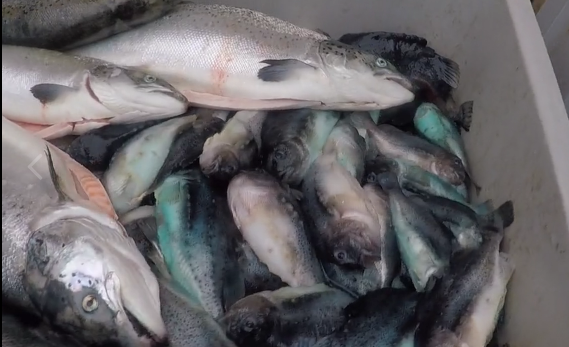The use of cleaner fish on Scottish salmon farms as a treatment for sea lice should be suspended due to serious welfare issues, according to a new report by animal rights campaigners.
Cleaner fish – mainly lumpsuckers and ballan wrasse – are used by the salmon farming industry to eat sea lice that infest salmon kept in sea cages.
The fish are used as an alternative to chemical and mechanical treatments for sea lice but a report published today by animal welfare charity, OneKind, highlights the serious health problems they suffer.
Salmon farmers say that cleaner fish are an effective way to manage sea lice but OneKind is calling for a moratorium on their use until better welfare safeguards are introduced.
The new report is called ‘Cleaner Fish Welfare on Scotland’s Salmon Farms’. Cleaner fish provide a service to other species by removing dead skin and ectoparasites.
OneKind’s report outlines problems such as high mortality rates, the need to provide supplementary food and shelter, and negative interactions with other fish.
In 2016, around 1.5 million cleaner fish were used on salmon farms in Scotland but this is predicted to rise to 10 million in the UK by 2020, as salmon farming expands.
Cleaner fish are protected by the Animal Health and Welfare (Scotland) Act 2006, which places a duty of care on those responsible for them to safeguard them from unnecessary suffering.
But OneKind says that mortality rates for cleaner fish are not published by the industry so it is not possible to know how many survive the full salmon production cycle.
The report points out that in Norway, wrasse mortality rates on salmon farms can be high. According to Marine Conservation Society, up to a million wrasse are caught each year for Scotland’s salmon farming industry.
OneKind director, Bob Elliot, said: “OneKind remains very concerned regarding the seemingly endless welfare issues concerning the expansion of salmon farms in Scotland. Rather than pausing and considering solutions, ever more intensive techniques are being deployed to manage the sea lice, overcrowding and disease problems.
“Our report shows that cleaner fish seem to be being used in ever greater numbers with very little scrutiny regarding their welfare. The use of cleaner fish should be halted until standards that protect their welfare are developed and enforced, and until these standards can be shown to be effective so that cleaner fish are able to live good lives worth living.”
Don Staniford of Scottish Salmon Watch said: “Salmon farms are so filthy that even cleaner-fish are struggling to keep them clean of lice. Video footage shot inside a salmon farm on the Isle of Mull show lumpsuckers infested with lice. Other damning footage shows carcasses of cleaner fish dumped in along with diseased farmed salmon in skips.”
In response, however, Julie Hesketh-Laird, chief executive of the Scottish Salmon Producers Organisation (SSPO), said that the use of cleaner fish has become an important biological way to manage sea lice.
She added: “Around two-thirds of Scottish salmon farms are currently authorised by the government’s Fish Health Inspectorate to use cleaner fish. The use of wild wrasse on salmon farms should meet the latest requirements in the RSPCA Assured standards.
“The salmon farming industry’s Code of Good Practice also covers handling practices, health checks and the adequate provision of hides. The Code of Good Practice is constantly under review as more is understood about these fish.
“Research and development on farming Ballan wrasse has been running for a number of years with the aim of supplying all the industry’s requirement for cleaner fish in the future. Significant investments have been made to develop appropriate hatchery and nursery facilities.”
A Scottish Government spokesperson said: “All farmed fish are protected by the Animal Health and Welfare (Scotland) Act 2006, which places a duty on fish farms to ensure their needs are met.
“Many fish farms employ dedicated cleaner fish staff who are responsible for ensuring cleaner fish are well looked after, and 70 per cent of the fish farming industry are signed up to the RSPCA welfare standards for cleaner fish.
“Fish farms must also keep mortality and veterinary records by law, which are inspected by the Scottish Government’s Fish Health Inspectorate. Significant cases of poor welfare observed during inspection are reported to the Animal and Plant Health Agency.”
A version of this story was published by The Sunday Post on 9 December 2018.
Photo and video thanks to Scottish Salmon Watch.














